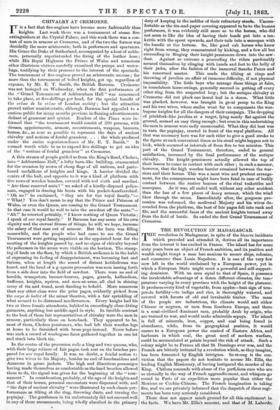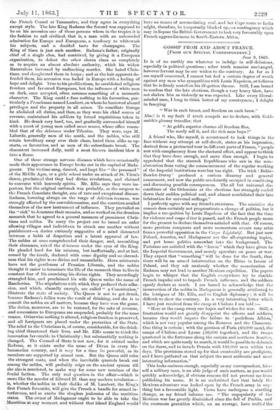THE REVOLUTION IN MADAGASCAR.
THE revolution in Madagascar, in spite of the bizarre incidents which preceded and attended it, derives all its importance from the interest it has excited in France. The island has for some sixty years been an object of French ambition, and its position and wealth might tempt a man less anxious to secure ships, colonies, and commerce than Louis Napoleon. It is one of the very few now left in the world unclaimed by a European power, yet in which a European State might erect a powerful and self-support- ing dominion. With an area equal to that of Spain, it possesses the incalculable advantage of a dozen different climates, the tem- perature varying in every province with the height of the plateaus. It produces every kind of vegetable, from apples—best sign of tem- perate fertility—to indigo and rice, is thoroughly watered, and covered with forests of old and invaluable timber. The mass of the people are industrious, the climate would suit either Chinese or negroes, or men from Southern Europe, and there is a semi-civilized dominant race, probably Arab by origin, who are trained to war, and would make admirable sepoys. The island is full of minerals, iron, copper, and coal being found in abundance, while, from its geographical position, it would ensure to a European power the control of Eastern Africa, and harbours in which coal, the great need of modern warfare, could be accumulated at points beyond the risk of attack. Such a colony might be to France all that St. Domingo ever was, and the French are bitterly irritated by a revolution which, as they imagine, has been fomented by English intrigues. So strong is the con- viction that the papers do not hesitate to accuse Mr. Ellis, the leading English Missionary, of having instigated the murder of the King. Clualons resounds with abuse of the perfidious race who are so eternally in the way of French aggrandizement, and whispers go round in Paris of an expedition more popular than either the Mexican or Cochin-Chinese. The French imagination is taking fire, and we are privately informed that the despatch of three regi- ments has been very seriously considered.
There does not appear much ground for all this excitement, in the facts. We have Mr. Ellis's account, and that of M. Laborde,
the French Consul at Tananarive, and they agree in everything except style. The late King Radama the Second was supposed to 'be on his accession one of those persons whom in the tropics it is the fashion to call civilized, that is, a man with an unbounded admiration for Europe and Europeans, a tendency to whitewash his subjects, and a decided taste for champagne. The King of Siam is just such another. R,adama's father, originally chief of a single clan, had contrived, by giving it a European organization, to defeat the other eleven clans so completely as to acquire an almost absolute authority, which his widow Ranavalona increased by unflinching murder. She hated Chris- tians. and slaughtered them in heaps ; and as the heir apparent de- fended them, his accession was hailed in Europe with a feeling of hope and delight. '1'rue to his predilections, he established religious freedom and favoured Europeans, but the influence of white men on dark, once accepted, often assumes something of a mesmeric character. The King could refuse nothing to his favourites, par- ticularly a Frenchman named Lambert, on whom he bestowed absurd privileges and the property in all mines. To conciliate Europe he abolished all duties, and then, as they were his chief source of revenue, maintained his soldiers by forced requisitions taken in kind. He drank very hard, too, and gradually surrounded himself with a court of young men called mena masoo, whose office resem- bled that of the delatores under Tiberius. They were, says M. Laborde, generally men of the south, and the nobles, who still retain hereditary sway over their clans, hated them alike as up- starts, as favourites, and as men of the subordinate breed. The discontent increased daily, until a most bizarre incident blew it into a flame.
One of those strange nervous diseases which have occasionally made their appearance in Europe broke out in the capital of Mada- gascar. The victims sang, danced, and leapt like "the possessed" of the Middle Ages, or a girls' school under an attack of St. Vitus's dance, proclaimed that they had divine revelations, and claimed to converse with heavenly spirits. Mr. Ellis says they were im- postors, but the original outbreak was probably, as the surgeon to the French Consulate thought, one of rare and exceptional disease. Radama, hovering always on the verge of delirium tremens, was strongly affected by the convulsionnaires, and the courtiers availed themselves of the new instrument of influence. They prevailed on the "sick" to denounce their enemies, and so worked on the drunken monarch that he agreed to a general massacre of prominent Chris- tians and nobles. To carry the project out he issued an order allowing villages and individuals to attack one another without punishment—a device curiously suggestive of a mind distracted between a habit of despotism and a latent approval of law. The nobles at once comprehended their danger, and, assembling their clansmen, seized the deiatores under the eyes of the King. He pleaded hard for his minions, but ineffectually, and at last, roused by the insult, declared with some dignity and no shrewd- ness that his rights were divine and unassailable. !lova aristocrats have not the gentleness of Prussian Liberals, and the nobles thought it easier to terminate the life of the monarch than to live in constant fear of his exercising his divine rights. They accordingly strangled him, and proclaimed his wife Queen under the name of Rasoherina. The stipulations with which they prefaced their adhe- sion, and which, absurdly enough, are called" a Constitution,' illustrate the state of society. The Queen is not to get drunk, because Radama's follies were the result of drinking, and she is to consult the nobles on all matters, because they have won the game. The duties, moreover, are to be restored, for the sake of revenue, and concessions to Europeans are suspended, probably for the same reason. Otherwise nothing is altered, religious freedom is preserved, and all foreigners are placed under the protection of the State. The relief to the Christians is, of course, considerable, for the drink- ing chief threatened their lives, and Mr. Ellis seems to think the innovation favourable to Christianity ; but substantially nothing is changed. The Council of State is not new, for it existed under Radama, as it exists under the name of Divan in every Mo- hammedan country, and it may for a time be powerful, as its members are supported by armed men. But the Queen still rules the strongest caste, and when the inevitable quarrels break out among the nobles, will probably reign on the ancient system till she also is murdered, to make way for some new nominee of the feudal faction. The only real question in the affair—which is more like the murder of Edward II. than any modern revolution— is, whether the nobles in their dislike of M. Lambert, the King's first French favourite, will give the French a handle for armed in- terference, and so excite the sleepless jealousies of the maritime states. The owner of Madagascar ought to be able to take the Mauritius at any moment, and without that island England would
have no means of accumulating coal, and her Cape route to India might, therefore, be temporarily blocked up,—a contingency which may indispose the British Government to look very favourably upon French aggrandizement in South-Eastern Africa.




































 Previous page
Previous page